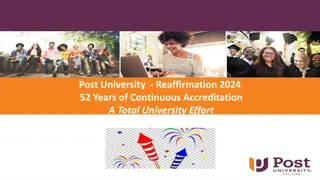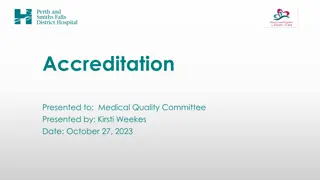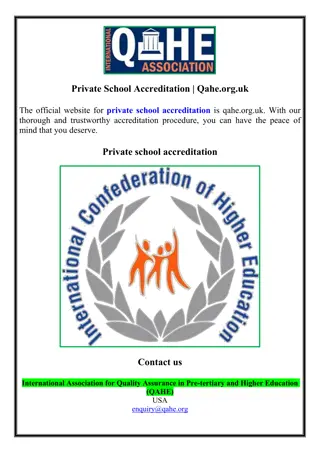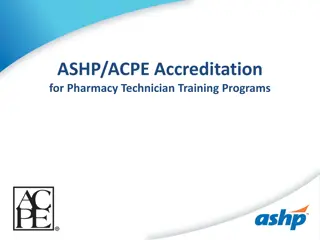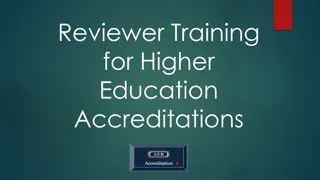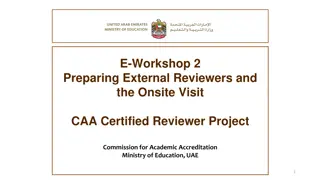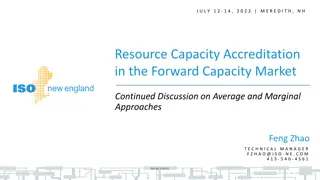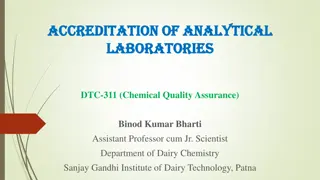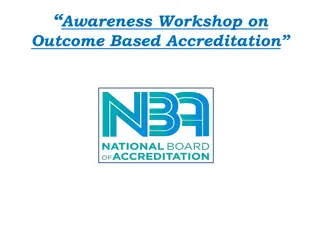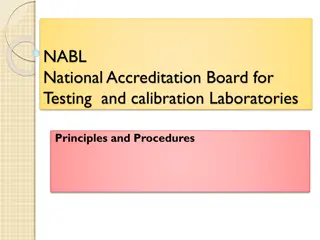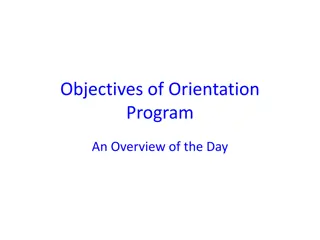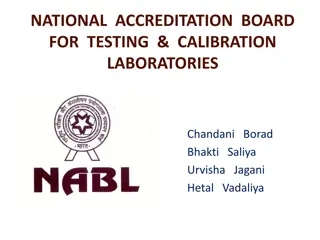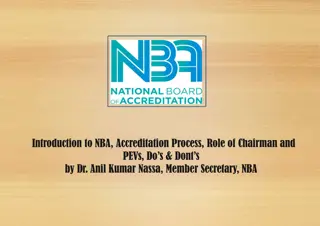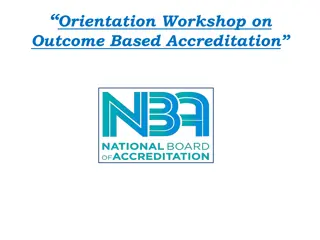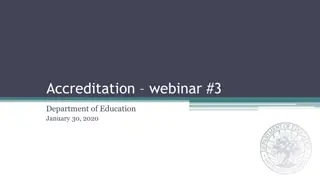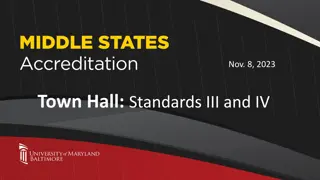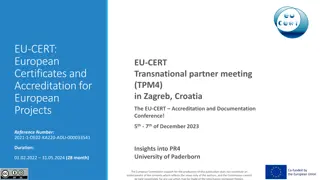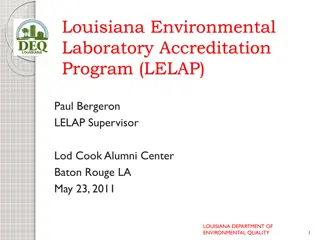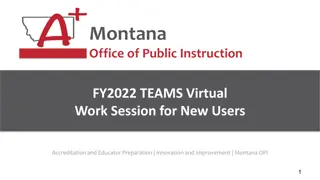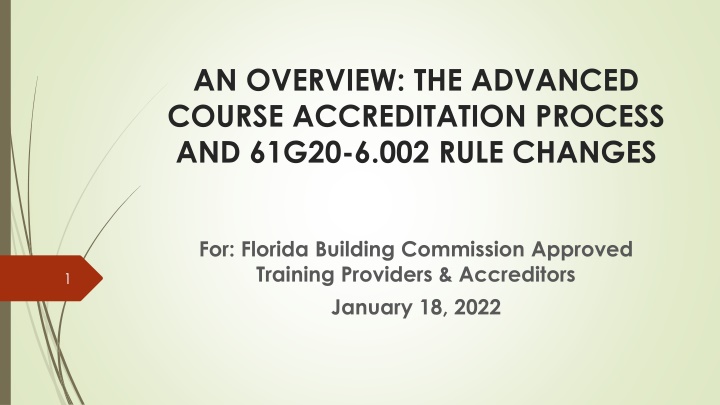
Changes in Florida Building Commission Accreditation Process
Explore the advanced course accreditation process for Florida Building Commission approved training providers and accreditors. Learn about the criteria for an advanced course application, recent rule changes, and updates to the application process. Discover the key components required for course accreditation and how providers can navigate the latest modifications for a successful accreditation submission.
Download Presentation

Please find below an Image/Link to download the presentation.
The content on the website is provided AS IS for your information and personal use only. It may not be sold, licensed, or shared on other websites without obtaining consent from the author. If you encounter any issues during the download, it is possible that the publisher has removed the file from their server.
You are allowed to download the files provided on this website for personal or commercial use, subject to the condition that they are used lawfully. All files are the property of their respective owners.
The content on the website is provided AS IS for your information and personal use only. It may not be sold, licensed, or shared on other websites without obtaining consent from the author.
E N D
Presentation Transcript
AN OVERVIEW: THE ADVANCED COURSE ACCREDITATION PROCESS AND 61G20-6.002 RULE CHANGES For: Florida Building Commission Approved Training Providers & Accreditors January 18, 2022 1
FLORIDA BUILDING COMMISSION ACCREDITATION PROCESS! 2 Florida Building Commission 1. Approves accreditor 2. Provider submits course application for accreditation to approved FBC accreditor, via Building Code Information System (BCIS) 3. FBC accreditor recommends courses for accreditation 4. Accredited courses submitted to Education POC 5. Education POC submits recommendations to Commission 6. Commission approves or denies recommendation, if approved, provider submits application to DBPR Licensing Boards 7. DBPR Licensing Boards accept/deny course(s)
WHAT DID AN ADVANCED COURSE APPLICATION CONSIST OF? 3 Described in Rule 61G20-6.002, as part of (4) (a) through (m) Syllabus Course description, learning objectives, course outline, course timeline Trainer materials (e.g., lecture notes, script, etc.) Participant materials (e.g., PowerPoints, handouts, manuals, tests, etc.) Method of course evaluation (stated in syllabus)
CHANGES TO THE ADVANCED COURSE APPLICATION 4 An Information/Instruction box will appear in the BCIS when a training provider clicks on the new course application. All of the ensuing changes discussed in this presentation will be depicted within this box. Also, links will be embedded within this information that will show examples of acceptable documents, such as a sample course outline or timeline. The term Internet is no longer required (61G20-6.002 (4)(a)(3)) to be placed in course titles, and has been deleted in the rule language In the revised new course application, under the category of Course Details then Method of Presentation , a category now reads computer/internet/online instead of computer/internet
CHANGES TO THE ADVANCED COURSE APPLICATION 5 Choosing Instructor Led or Online (in the BCIS as a stand alone choice) is no longer required. Instead, the choices of Computer/Internet/Online or Live Instructor Led are located under Course Details then Method of Presentation Instead of the previous five upload categories that were present under Attach Documents (Course syllabus, Course materials, Detailed course outline, Detailed course timeline, Learning Objectives), the modified choices are Course Reference Materials and Course Presentation Materials (See next slide for description of each)
CHANGES TO THE ADVANCED COURSE APPLICATION 6 Course Reference Materials consist of Course syllabus Course outline Course timeline Course learning objectives Course Presentation Materials consist of Participant materials (e.g., PowerPoint presentations, quizzes, tests, other training documents) Method of Evaluating the Course (i.e., participant evaluating the course) Certificate of Completion (example found as a link in the upfront Instruction/Information box)
CHANGES TO THE ADVANCED COURSE APPLICATION 7 As part of the Course Presentation Materials , a title slide for all PowerPoints or other presenting documents to participants is now required to include the course title, hours of course credit, Florida Building Code Edition, and course provider name, address, phone number, email address
ADVANCED COURSE DEVELOPMENT CONSIDERATIONS 8 At least 50% of course content must be directly related to current version of the building code Course itself must be developed using the current version of Fla. Building Code (7th edition) Course materials must be converted to PDF format to be uploaded into BCIS Must be checked for building code content accuracy and currency through the accreditation process Must be technical in nature and relate directly to the design and building construction industries
HOW A PROVIDER WORKS WITH AN ACCREDITOR 9 When course is uploaded into BCIS, and accreditor is chosen, the accreditor will be notified via the BCIS Accreditors are considered private entities (approved by the FBC) and will explain the process to the provider and identify their fee Average review time for a one-hour course is 3-5 workdays Accreditors may have to contact providers with questions and requested revisions Accreditor will complete the course application with comments (if needed) Both accreditor and provider will receive email notice generated by BCIS after course is accredited
ACCREDITOR REVIEW OF MATERIALS 10 To determine if code content (e.g., references, tables, graphs, pictures, numbers, verbiage, etc.) is accurate (Most Important) To determine if at least 50% of content is directly related to the current code To determine if course description describes course materials To determine if objectives met through the materials To determine if course outline/timeline reasonable given the course topics To determine if the course materials are complete, based on the FBC Rule 61G20-6.002 revised language of what is identified as part of the course (e.g., such as a test noted in the syllabus for an online course)
STEPS FOR THE ADVANCED COURSE (AC) ACCREDITATION PROCESS 11 AC is uploaded into the BCIS AC is reviewed by the accreditor (chosen when submitting and uploading materials into the BCIS) AC is accredited (according to building code content accuracy and currency with the latest version of the code) Accredited AC is reviewed by the FBC ED POC & Education Administrator If a course is compliant with all requirements set forth in Rule 61G20-6.002, it will be recommended for approval. If a course is non-compliant, it will be recommended for denial. The training provider and/or the accreditor may appear at the Ed POC meeting or the full commission meeting to request approval. Accredited AC is reviewed and approved/not approved by FBC at the Plenary Session Approved AC moved to approved status in the BCIS, within three days of Plenary Session BCIS will generate an email and send to provider verifying a course s approved/not approved status Accredited/approved AC is submitted by provider to appropriate licensing board at DBPR
THE MOST COMMON MISTAKES PREVIOUSLY FOUND BY REVIEWERS (NOT ACCREDITORS) OF ADVANCED COURSES! 12 The syllabus is not complete A Method of Evaluation is missing A test or online quiz is mentioned in the syllabus but is missing from the materials Mistakes are made on slides, such as misspellings The correct answers for tests/quizzes are not identified for review The code date/version are incorrect in the course materials Mistakes are made regarding code content in the PowerPoint slides

